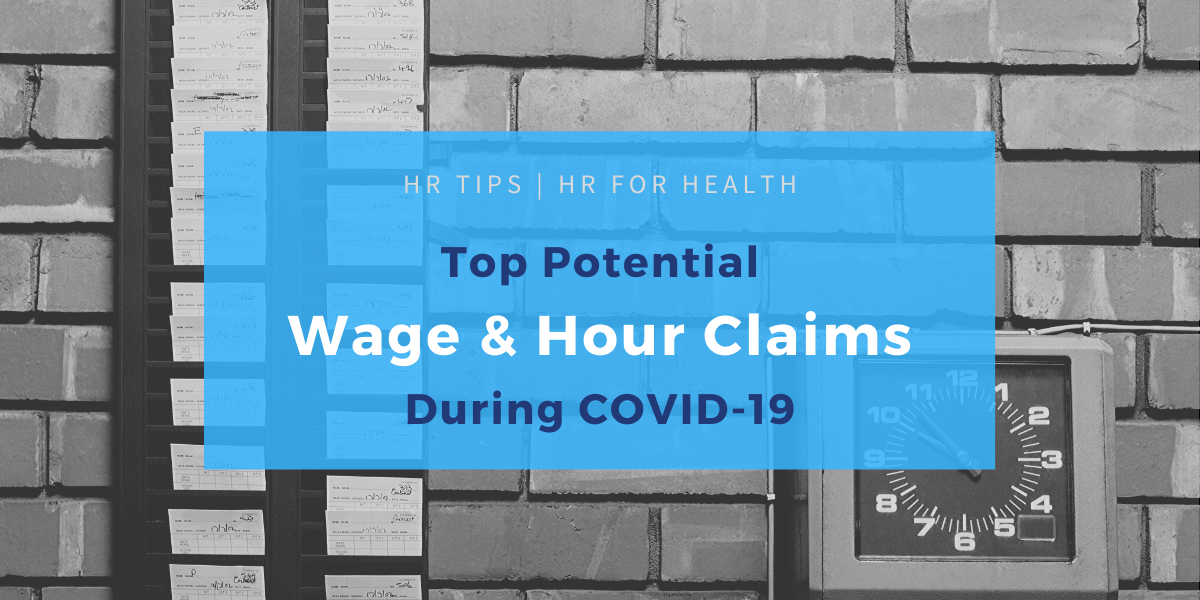- Current News
- Wage & hour
Wage and Hour Claims – COVID-19

Updated on 11/5/2021, 11:14amPST
The novel coronavirus has forced employers to adapt to a frenzy of unforeseen workplace situations, with guidelines and regulations for addressing them often ever-changing and unclear.
Whether your employees are furloughed, laid off, or working from home, it’s important to be aware of key areas of potential liability to help protect your practice from wage and hour claims. Reviewing your pay practices to ensure compliance with changing laws may help avoid costly lawsuits down the line.
First, it pays to have a firm grasp of all the legal and governing authorities that may have jurisdiction on new workplace situations arising from COVID-19. On the federal level, the Department of Labor’s Fair Labor Standards Act (FLSA) enforces pay and overtime rules, and the Occupational Safety and Health Administration (OSHA) enforces worker safety.
During the pandemic, the Centers for Disease Control and Prevention (CDC) has been issuing advisories as the federal voice of public health. The federal Families First Coronavirus Response Act (FFCRA) has imposed rules on paid sick and family leave. Add to that mix, there are existing state labor codes and new and often far-reaching pandemic-response laws enacted by state and local governments.
On top of having to monitor new regulations from a jumbling array of jurisdictions, the situation is further complicated by the lack of existing case law for relatively new employment areas, such as working from home, required temperature checks, and mandated personal protective equipment.
However, given all that, it is still possible to protect your practice by being aware of some emerging situations that are expected to generate wage and hour claims as a result of the COVID-19 crisis. Below are the top areas of potential concern:
1. Employees seeking reimbursement for remote-work business expenses
Employers have long been required to reimburse employees for necessary costs associated with employees doing their jobs. In the past, this was limited to travel, mileage, professional development, and the like. But in an increasing number of states, a legal foundation is being set for reimbursement of expenses for cell phone and Internet service plans. The law is firmly established in California, with Illinois, Iowa, Montana, New Hampshire and South Dakota, also enacting laws governing reimbursement of employee expenses.
A key term here is “necessary.” The telecommuting would have to be required–as it likely has been during the pandemic. And the expenses would have to be necessary to the employee performing his or her job. For example, while cell phone, Internet service, and videoconferencing costs would probably be reimbursable, an ergonomic chair and extra-large monitor would likely not be. As in many of these scenarios, you may want to seek legal advice on whether to err on the side of caution and provide reimbursement to avoid future claims.
2. Employees seeking reimbursement for personal protective equipment
Although authorities initially advised against the public wearing masks and face coverings, arguing they should be reserved for first responders, the CDC changed its stance, advising face coverings in situations where social distancing wasn’t possible. Many state and local governments followed suit, also adding provisions that employers open to the public provide gloves and masks. Because each state and local government has its own rules, it’s best to consult with your local jurisdiction to make sure you are providing personal protective equipment, if required.
3. Employees contending they didn’t receive final paychecks in timely manner
Practice owner’s biggest responsibility is to pay employees for their work, however in the era of COVID-19, that may be easier said than done. Federal law doesn’t require that employees being laid off or terminated receive their final paycheck immediately. But many states have requirements ranging from employees being paid immediately to within several days. It’s best to check with your state labor department to make sure you are on the right side of the law in giving employees their final paychecks.
4. Remote non-exempt employees claiming nonpayment for all hours worked
Some non-exempt employees may argue that they worked during an unpaid furlough or that a relaxed timekeeping system used during COVID-19 didn’t accurately reflect the hours they worked. To combat claims such as this, you might adopt a written policy requiring that non-exempt employees record all hours and breaks, employ a software system to track hours, or ask non-exempt employees to stick to their regular schedules.
While it may be tempting to refuse payment of unapproved work, you still must ensure that employees do in fact get paid for their time. You do have the option to discipline if the employee failed to follow your direction and/or worked when they should not have.
The FLSA doesn’t require employers to pay non-exempt employees for hours they would have worked, in the event that work is not available. Federal law also allows hourly rates for non-exempt employees to be reduced, providing they are at least paid the minimum wage.
Recommended Reading
COVID-19 Resources for Employers
5. Exempt employees claiming pay was reduced in violation of salary rule
Under FLSA rules, exempt employees must be paid their full salary if they perform any work during a workweek, however aren’t required to be paid if they perform no work during a workweek. In the event of a business slowdown, however, employers may sometimes legally impose a pay cut for exempt employees. Something to keep in mind when making salary deductions and/or reducing a salary in general is that there are federal and state guidelines regarding a minimum salary. Should you choose to deduct from or reduce the total salary, you must be mindful that the salary does not fall below the minimum threshold that is required.
6. Exempt employees claiming they were forced to take vacation for office closures
This claim would likely have no merit, since employers can request that employees use their leave time for full or partial days they have taken off. However, given the current situation of the pandemic, we advise to be as flexible as possible Another possibility is the employee requesting a vacation payout for hours that have not yet been accrued. In this case, we recommend proceeding cautiously with this type of request because it can be very difficult to recuperate this money in the case where an employee decides not to return to work.
7. Employees taking issue with performing work outside of job description
While FLSA doesn’t limit the type of work that employees over age 18 may be required to perform, the Department of Labor requires exempt employees to be primarily engaged in exempt work. Although employees can be shuffled to combat a labor shortage caused by employees being sick or quarantined, employers should consult their human resources attorneys and any bargaining unit if employees are expected to be assigned to a different type of work during the pandemic.
We provide services to help you handle compliance with state laws, hiring, and all your other HR needs. If you have questions about managing your employees during the COVID-19 pandemic or any other questions, please reach out to us and SCHEDULE A CALL, or call: 877.779.4747, or email: [email protected].
HR for Health is one of the nation’s leading Human Resources Management Systems (HRMS) used by small to mid-sized practices. HR for Health has provided the following complimentary articles to ensure you have a game plan when addressing complex HR matters.
Quick note: This is not to be taken as legal or HR advice. Since employment laws change over time and can vary by location and industry, consult a lawyer or HR expert for specific guidance. Learn about HR for Health’s HR services
Tags

